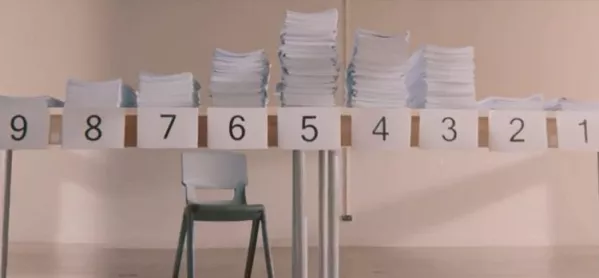- Home
- ‘The school system is based on fear’
‘The school system is based on fear’

So much for the brave new world of computer science GCSE. On Monday I caught a radio news report saying that only 12 per cent of GCSE candidates have opted for the new, tougher and more technically demanding GCSE, which replaced the largely dull and repetitious computer studies/ICT qualification. The reason for the low take-up? Apparently, the new qualification is just too difficult.
How tempting it is to bewail the fecklessness of today’s youth. Are those youngsters declining to take an exciting new coding-based GCSE course just too feeble and lacking in resilience to tackle a subject that is now, at last, properly intellectually demanding?
I don’t see it that way. Indeed, today’s teenagers appear readier than their predecessors to rise to a challenge when something has piqued their interest. Besides, new subjects or programmes of study are frequently slow to catch on: students (more than we might choose to admit) follow the lead of older year groups. That’s not the real reason, however.
Is the new GCSE really too difficult? I doubt it. But it is harder than its predecessor, and candidates nowadays are canny about the subjects they choose. They need to bank good GCSE grades for when they come to apply for whatever they do after school, whether university, an apprenticeship or employment. That makes them cautious. They don’t want to take a chance on a subject whose structure and marking may not be safely established: they don’t want that element of risk in their portfolio of expected results.
Today’s exam candidates are risk-adverse, then. But that’s no surprise: so are their schools.
Nearly three decades of unremitting government pressure - in the form of inspection, benchmarks, floor targets, Progress 8, EBacc and countless other crude measures - has engendered a similarly risk-averse atmosphere in schools. If the kids want to avoid a less-than-glorious grade at all costs, so do their schools. For the institution as for the child, the stakes are too high.
‘The stakes are too high’
Giving the National Education Trust’s Mike Baker lecture last Tuesday, Geoff Barton, general secretary of the Association of School and College Leaders, bemoaned this fact. He can sympathise with school leaders who, feeling themselves under the cosh, understandably succumb to the temptation to play safe, to focus on those safe, middling grades that satisfy whatever government demands this year.
Such anxiety and caution are inevitably transmitted, in turn, to pupils, even when it comes to choosing subjects. In vain, we urge children to take subjects that fascinate them. In the current climate, they’re more likely to choose those in which they feel there is a relatively easy win. If nothing else, it will keep the pressure from school off their backs.
Barton is unwavering in his message. Time and again he urges school leaders to rediscover their courage, not to be pushed around by government measures like EBacc that add value to neither school nor candidate. Instead, we should fight to retain a broad, civilised, challenging curriculum for all - including the creative subjects.
It’s loss of courage that does the damage. Young people are perhaps diffident about choosing this new, challenging subject. Perhaps schools and their leaders are timid in their turn. But the lack of courage starts at the top, with government.
Government ministers distrust teachers, constantly requiring them to produce data, track progress and “deliver” (that word I detest) results. In consequence, teachers are routinely discouraged from being brave, inventive or original in what they teach or in the subjects they encourage children to take.
The infamous Captain Bligh of HMS Bounty is said to have announced: “The beatings will continue until morale improves.” His voyage didn’t end well.
If government would only find the courage to trust its educators instead of driving them, then, in turn, it would engender greater courage in the pupils. Then our education system would begin to blossom.
Dr Bernard Trafford is a writer, educationalist and musician. He is a former headteacher of the Royal Grammar School, Newcastle, and past chair of HMC. He is currently interim headteacher of the Purcell School in Hertfordshire. He tweets @bernardtrafford
Keep reading for just £1 per month
You've reached your limit of free articles this month. Subscribe for £1 per month for three months and get:
- Unlimited access to all Tes magazine content
- Exclusive subscriber-only stories
- Award-winning email newsletters



